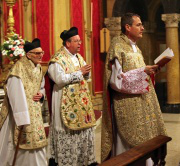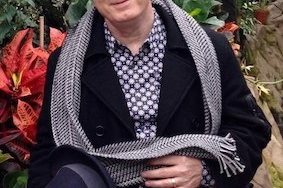St Philip Neri: 'an example of how to evangelise'

"As we celebrate this Feast of St Philip Neri today, we need go no further than to turn to him as an example of how to evangelise," said Mgr Mark Crisp, Rector of St Mary's College, Oscott, during his homily at the Birmingham Oratory on Thursday 26 May.
Preaching at the Oratory of St Philip Neri, Edgbaston, founded by Blessed John Henry Newman, Mgr Crisp said that one of the recent initiatives of Pope Benedict XVI has been to call the Church to begin to seriously address the issues of the New Evangelisation.
Mgr Crisp said: "The Holy Father has set up a new Pontifical Council for Promoting New Evangelization and choosing it as the theme for the Synod of Bishops in 2012. He is calling together some of the greatest intellects and some of the greatest evangelisers of our time in order to sift through what’s useful and what isn’t, in terms of ways of thinking, ways of praying, ways of speaking and ways of doing."
Mgr Crisp said: "Whatever documents come out of the synod next year, however, there will not really be any change on the ground unless people like you and me take up the challenge to evangelise. Being a cradle Catholic myself, I still feel the chill of fear when I hear that word, wondering what on earth it means I’ve got to do.
"As we celebrate this Feast of St Philip Neri today, we need go no further than to turn to him as an example of how to evangelise - this saint, so full of joy and wit, so enthusiastic for the salvation of souls, so full of the love of God that spilled out to all whom he met."
Mgr Crisp said: "St Philip was one of the first truly modern saints. He was not a monk, or friar and he was convinced that holiness could be lived right in the heart of society, mixing with all the worldly characters of his day and knowing all the social graces, whilst internally living an ascetic lifestyle.
"His witness of holiness was to live a normal life on the outside, but on the inside a life of penance. Immediately we hear that word, we think of gloom and sadness, but actually it was this life of penance which kept him close to the source of joy.
"St Philip’s witness shows us what any of us can do in Birmingham in 2011. He invites us to stir up and rekindle our love of God; to increase our love so much, that we might desire to suffer for God.
"St Philip invites us to use everyday penances as acts of love of God. The wonderful thing is that the more we love God the more alive we become and the more we are filled with joy. By clinging to the cross, we also cling to the risen life of Christ which is powerful eternal life."
Mgr Crisp concluded: "The Bishop's Conference in England and Wales made a decision a few weeks ago which I believe will have profound effect on the way Catholics can evangelise in this country. It was the decision that from next September, Catholics are to be asked to return to a corporate act of Penance on Fridays by abstaining from meat.
"I don’t mean this in a superficial way, when people don’t choose meat in the restaurant. No, I mean on a spiritual level. Encouraging us, as Catholics, to get back to the idea of a weekly penance will have a profound effect on our lives.
"This decision by the Bishops Conference is a bit like spiritual heart surgery done on the body of Catholics in this country. It will certainly challenge us, a bit like the new diet a doctor would give to someone to get over their heart surgery, but the result will be a Church that is far more alive and far more full of the joy of the risen Christ.
"Like St Philip we might become a joyful, lively people, an attractive leaven in our society. That is when we will truly be able to evangelise."
The beautiful music, liturgy, vestments, flowers and candles added to the sense of occasion. The Kyrie, Gloria, Credo, Sanctus, Benedictus & Agnus Dei were from the "Missa pro Victoria" by Tomás Luis de Victoria (1548-1611).
Tomás Luis de Victoria lived many years in San Girolamo in Rome, at the same time as St Philip. He was ordained priest in 1575 in the English College, Rome, by Bishop Goldwell, the last surviving English Catholic Bishop from Queen Mary’s reign. Victoria returned for his final years to Spain as director of music to the Empress. This is the fourth centenary of his death in 1511.
Fr Richard Duffield, the Provost, was the principal celebrant together with a deacon and sub-deacon. Among the concelebrants were Fr Gregory Winterton, Fr Paul Chavasse, Mgr Mark Crisp and members of staff at Oscott College; and other guests of the Fathers of the Birmingham Oratory.
The Choir sang the Offertory Motet, 'Pangamus Nerio debita cantica' to a setting by William Sewell, choirmaster at the Birmingham Oratory more than a hundred years ago: "Let us sing praises to St Philip Neri whose goodness and renowned merit have carried him beyond the starry firmament, to find holy joys."
The Mass concluded with Newman's hymn about St Philip: "This is the Saint of gentleness and kindness."
















